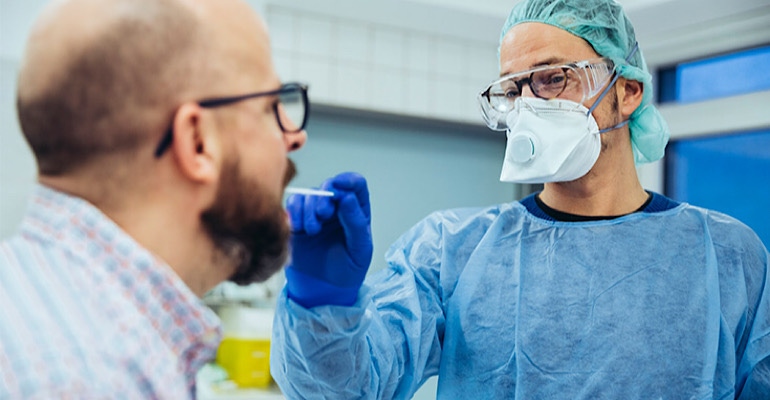How Next-Generation Sequencing Will Help Scientists in the COVID-19 Battle
Illumina has brought next-generation sequencing to the COVID-19 frontlines, which will be key to understanding and fighting the SARS-CoV-2 virus going forward.
June 12, 2020

FDA gave Illumina the greenlight to bring the first next-generation sequencing COVID-19 diagnostic test to the U.S. market, which is expected to become a key weapon in the battle against the virus.
“Throughout the COVID-19 pandemic, we have seen the ingenuity that results from the FDA working in partnership with the private sector. Having a next-generation sequencing diagnostic tool available will continue to expand our testing capabilities. Additionally, genetic sequencing information will help us monitor if and how the virus mutates, which will be crucial to our efforts to continue to learn and fight this virus,” said FDA Commissioner Dr. Stephen Hahn, M.D.
The agency issued an emergency use authorization to Illumina for the COVIDSeq Test for the qualitative detection of SARS-CoV-2 RNA from respiratory specimens collected from individuals suspected of COVID-19 by their healthcare provider. Using next-generation sequencing means that the test can generate information about the genomic sequence of the virus present in a sample, which can be also used for research purposes.
“COVIDSeq leverages the performance of NGS to help address the global need for diagnostic testing to fight the COVID-19 pandemic,” said Illumina CEO Francis deSouza. “Beyond diagnostic testing, Illumina and a number of our customers are exploring NGS-based workflows to enable high-volume screening to support a return to work and school.
Next generation sequencing is a type of diagnostic technology that can determine, among other things, the genetic sequence of a virus. Comparing sequencing results over time can help scientists understand if and how viruses mutate. COVIDSeq uses upper respiratory specimens, including a nasopharyngeal or oropharyngeal swab, and delivers sample receipt to result in 24 hours using the NovaSeq 6000 Sequencing System. Illumina said the differentiated diagnostic design includes 98 amplicons that target the full SARS-CoV-2 genome, creating accurate detection and high sensitivity. COVIDSeq is currently available to a limited number of early access sites and is expected to be more broadly available this summer.
The workflow accommodates up to 3,072 samples per NovaSeq run leveraging the S4 flow cell, and includes steps for viral RNA extraction, RNA-to-CDNA conversion, PCR, library preparation, sequencing and report generation. The key components leveraged include the NovaSeq 6000, coupled with Illumina Tagmentation library preparation technology, and the DRAGEN COVIDSeq Test Pipeline for rapid reporting.
How does next-generation sequencing help in COVID-19 testing?
During Illumina's first-quarter earnings call on April 30, deSouza said that the company's mission to improve human health by unlocking the power of the genome has never been more relevant.
"Susceptibility to COVID-19 is almost certainly in part genetic," he said, according to SeekingAlpha transcripts of the call. "And it’s important to understand the interactions between viral and host genetics to potentially identify those individuals most at risk and support the development of therapies and vaccines."
Illumina is supporting multiple collaborations with partners, including the New York Genome Center, Stanford, Adaptive Biotechnology, and Genomics England to better understand the evolution of the viral genome and potential genetic factors determining an immune response, deSouza said. In terms of testing, while the majority of testing has and will occur using PCR and serology-based tests, deSouza said there are numerous groups looking to multiplex testing using next-generation sequencing technology.
In response to an analyst question during the earnings call, deSouza said he expects to see more NGS testing happen for diagnostic testing of symptomatic individuals.
Will next-generation sequencing support COVID-19 surveillance capabilities?
Some Illumina customers are working on ultra-high throughput NGS-based screening tests for return to work programs, deSouza said. While these efforts are early, our teams are working to help customers meet the testing challenges that have been highlighted as critical to enable our economies to sustainably recover without placing individuals at risk.
Even at that time, Illumina had already released a number of workflows and data analytics to help identify the virus and track its transmission, deSouza said, including: a shotgun metagenomics application to enable researchers and academics to detect and characterize SARS-CoV-2 and other novel pathogens for epidemiology; the application also supports the unbiased detection of co-infections and the profiling of host response genes to study co-morbidities and human immune response; an enrichment workflow for public health labs to enable highly accurate detection of SARS-CoV-2 and viral sequence information to optimize containment strategies and identify co-infections of other respiratory viruses that may require different treatments; an amplicon workflow to support public health labs studying SARS-CoV-2 epidemiology with co-infections at higher sample volumes; and a new software toolkit that makes it easier for researchers to detect and identify SARS-CoV-2 viral sequences and contribute their findings to public databases. Illumina has made that toolkit freely available to anyone using an Illumina sequencer, deSouza said.
"So there is another need for NGS to be used in surveillance capabilities," he said. "Another area that’s emerging is the idea of using ultra high throughput screening testing to bring people back to work, and so there are concepts being developed by customers of ours around using NGS to deliver that ultra high throughput screening capability to move healthy people back to work, and in some cases to do regular testing to keep healthy people back at work. And so we’re seeing that emerge as a possibility as well for NGS based testing."
And other emerging need for next-generation sequencing in the fight against COVID-19, deSouza said, is in research. That could be to develop additional diagnostic tests, therapies, or to better understand host responses, he said.
Click here to see what other medtech CEOs are saying about COVID-19.
About the Author(s)
You May Also Like




